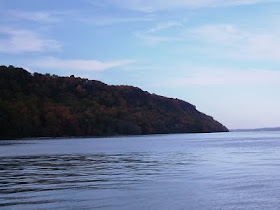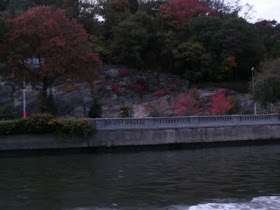Pages
▼
Friday, December 25, 2009
Sunday, December 20, 2009
Snow arrives in Friendship
Friday, December 18, 2009
Thursday, December 17, 2009
Freezing morning in December - Back River, Friendship, Maine
The Back River is an arm of the Meduncook River which separates Cushing and Friendship. This shot was taken near high tide on Wednesday, December 16. Though snow had fallen, and there had been some cold days, there had been a thaw after the first cold snap, The ground was still wet and workable. Wednesday was a freezing day. Thursday it headed down to 5 F and the ground froze.
Shots of the Back River (the one above) were taken from our land. (Mostly through the living window.) Those from a height are mainly from east Salt Pond Road, Cushing. The slideshow is chronological from December 13 (when I got here) until December 31, god willing.
Tuesday, December 15, 2009
Fedoras, Bowlers, & Caps

As you know I am rarely seen on the street without a hat. I wear caps at home. I just don't like that I am so bald. I like being the odd man fashion wise - wearing fedoras often. And I do think that men look good wearing hats. Look at these baseball fans in 1910 watching a baseball game from a roof across the street from Shibe Park (Connie Mack stadium), home of the Philadelphia Athletics (later of K.C. and Oakland).
Click image to enlarge
Monday, December 14, 2009
Winter shrimp -Port Clyde Fresh Catch
The winter shrimp run has begun. It's dragger caught now. Later we'll get trap shrimp. $1.50/lb on the roadside. Still bountiful sea.
What matters to you about the seafood you eat?
- That it’s wild-caught in an environmentally sustainable way?
- That it’s of exceptional quality and handled with great care?
- That you can trace the short, speedy path it follows from the moment it’s harvested until it reaches your plate?
- That you’re helping sustain one of the last traditional fishing villages in Maine?
If your answer is “yes”, then Port Clyde Fresh Catch™ lobster, shrimp, fish, and crab are for you.
Thursday, December 10, 2009
Tuesday, December 8, 2009
Monday, December 7, 2009
Hunters of Greenland
The Times has posted a spectacular slideshow by Ragnar Axelsson of hunters in the east of Greenland who spend up to two months on the ice. It looks like Ansel Adams' Yosemite carved in ice. A wonderful place to visit if it weren't so...cold.
Well maybe in the summer for the salmon run....if it weren't for the...mosquitoes.
Well maybe in the summer for the salmon run....if it weren't for the...mosquitoes.
One of my heroes - Rockwell Kent - was shipwrecked there and stayed, painting what Axelsson has photographed. His stay was warmed by... Salamina.







Saturday, November 28, 2009
Provincetown Sleigh Ride
Nantucket Sleigh Ride is what they called being hauled around the ocean in a skiff with a harpoon in a whale - in the days of Ahab.
Dave Lamoureux paddles his 12 foot kayak off Race Point, Provincetown, Mass and gets the same thrill when he - occasionally - hooks a blue fin tuna - and 3 times now - lands one. The pictures are above and the story HERE
Friday, November 27, 2009
Changing New York 1932-1935: Photographs by Berenice Abbott
The great photographs taken by Berenice Abbott for the Federal Arts Project 1932-1935, are available online thanks to the New York Public Library. Below are some thumbnails. Click on Changing New York 1932-1935 to view the images.
They are: St. Bartholemew's Church and Waldorf Tower, Starrett Lehigh Bldg - West Street, tug, Lackawanna RR- Freight Station-North River, Pier 11, Penn Station, rail freight cars - East River piers, Central Jersey RR rail-ferry station - North River, East River Skyport, Manhattan Bridge
Thursday, November 26, 2009
Tuesday, November 17, 2009
Transat Jacques Favre: Rescue at Sea
There is little more dramatic and rare than a rescue at sea. Sebastien Josse, the great French solo sailor, and his crew in the short-handed Transat Jacques Vabre (a peculiarly French obsession) had that rare and wonderful (looking back) experience. The Portuguese Air Force video is below. The Team BT Imoca 60 has been found and is now under tow.
The race began November 8. It is a long way to go for a cup of coffee: from LeHavre, France to Port Limon, Costa Rica. There are four classes. Today is day 9 and the fleet is west of the Canaries.
Monday, November 16, 2009
Groupama: hull damage forces abandonment of Jules Verne Trophy try
After five days at sea, averaging 25 knots, with a 345 mile lead over the current Jules Verne record holder - Bruno Peyron's Orange 2 - Franck Cammas and his nine crew aboard the giant trimaran Groupama 3 have abandoned their quest to claim the Jules Verne Trophy after sustaining damage. The boat is now headed to Cape Town for repairs. They crew hopes to restart from France in January.
The trophy was offered to the first yacht to sail around the world in less than 80 days. Phileas Fogg went around the globe in 79 days 6 hours 15 minutes and 56 seconds. The current holder is Orange II skippered by Bruno Peyron in 50 days 16 hours 20 minutes and 4 seconds.
The race rules are wonderfully simple:
Route
- The Jules Verne Trophy's starting point is defined by an imaginary line between the Créac'h lighthouse on Ouessant (Ushant) Island,France, and the Lizard Lighthouse, UK. Circumnavigate the world leaving the capes of Good Hope, Leeuwin, and Horn to port. Cross the starting line in the opposite direction.
- The starting line is open as of the official ratification of the trophy's rules by the World Sailing Speed Record Council.
Rules
- Propulsion of the boat must solely be by natural forces of the wind and of the crew.
- The Jules Verne trophy is open to any type of boat with no restrictions.
- Crew size is not restricted.
- The circumnavigation must be completed non-stop and with no physical outside assistance.
- Challengers must respect safety rules.
Sunday, November 15, 2009
Keeping it simple: Subway signs


Personally I don't like Helvetica, or Courier (which the New Jersey Rules of Court demand). And I do hate the 8 point internet protocol helvetica default. Don't like Verdana (like this), either. I like Times New Roman, Georgia, and other justified types. But, though purists may lament the MTA's occasional errors, you have to admit that those plain Helvetica fonts work well for subway signage.
Images: New York Times
Wednesday, November 11, 2009
The A Train: Bound for Sea!

Some like the Basel Action Network say it is junk science that sends junk subway cars to the ocean bottom.
Others, like the New Jersey Department of Environmental Protection, and Ocean City, Maryland bought the line and the old cars, and, well, dumping them at sea.
Personally I would pile them higher and deeper.
Friday, October 30, 2009
Harriman Legacy to Palisades Parks - 100th Anniversary
 100 years ago the Harriman family gave $1 million and 10,000 acres of land to the State of New York, forming the backbone of Harriman and Bear Mountain State Parks - part of the Palisades Interstate Park.
100 years ago the Harriman family gave $1 million and 10,000 acres of land to the State of New York, forming the backbone of Harriman and Bear Mountain State Parks - part of the Palisades Interstate Park.The state had planned to build a prison on terraced land along the river at Bear Mountain. Historic Forts Clinton and Montgomery, as well as the scenic lands surrounding Bear Mountain itself, became a real possibility. Orange County residents Edward Henry Harriman and his wife Mary Averell Harriman ardently resisted this plan. Edward died unexpectedly at 61 and the gift was presented by his 18 year old son, the future Governor W. Averill Harriman. For more on the history, importance, sights, and facilities of the great parks, go the the Palisades Parks Conservancy.
Tuesday, October 27, 2009
The Dutch depart

Just one of Tugster's beautiful shots of the Flinterborg bound for sea with its cargo of traditional Dutch vessels. (click to enlarge thumbnail)
Sunday, October 25, 2009
Steel arches: Harlem River Autumn Afternoon

The Harlem River was the Harlem Creek until the ship canal cut through the monolith at Baker's Field, making a deep water channel to the Spuyten Duyvil Creek and the North (Hudson) River. The marshes of upper Manhattan and Marble Hill are gone. What remains is a nautical industrial corridor which exposes the infrastructure of the City.

















